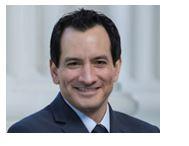Assemblymember Phil Ting (D-San Francisco), Chair of the Assembly Budget Committee, released the following statement about the 2019-20 Assembly Budget Plan, which was adopted today by the full committee. Ting’s statement is as follows:
"The Assembly Budget Plan continues investing in priorities that strive to make life better for all Californians. With this spending proposal, we renew focus on ending Great Recession Era cuts and put the state on a path that lifts up more Californians by increasing educational opportunities, expanding access to healthcare and strengthening social infrastructure – all while building robust reserves to sustain these investments in the event of an economic downturn. In times of unparalleled prosperity, there’s no reason we can’t help our most vulnerable residents. I applaud Governor Newsom for starting this process with a responsible, progressive vision for California, and I look forward to working with him and the Senate to deliver a balanced, on-time budget.”
A statement from Assembly Speaker Anthony Rendon (D-Lakewood) is as follows:
“I’m grateful for the hard work that’s gone into putting forth an Assembly budget package that focuses on the things that will keep California moving forward. Under this budget, we take care of needs, continue strengthening the foundation of early childhood education, and bring $1.5 billion in new, needed cost relief to our school districts, all while adding to our savings for the future. It’s a road map that broadly combines the vision of Governor Gavin Newsom and the ideals valued by the Assembly.”
Key investments in the 2019-20 Assembly Budget Plan include:
Increasing Educational Opportunities:
- Expand Early Childhood Education programs to include 10,000 full-day preschool slots, 6,172 general child care slots and 16,831 alternative child care vouchers that support parents working non-traditional hours when childcare centers aren’t open
- Raise per pupil spending to over $12,000, and provide an additional $1.5 billion to offset rising school district costs and another $1.5 billion to help pay down pension liabilities
- Fully fund the university systems to prevent tuition increases and increase undergraduate student enrollment growth at UC by 2,500 and CSU by 7,295; boost financial aid by providing a second tuition-free year at community colleges, more than doubling the number of competitive Cal Grant awards to 70,000 and extending Cal Grant awards to summer coursework
Expanding Access to Healthcare:
- End major Great Recession Era cuts by restoring all optional Medi-Cal benefits, various Medi-Cal rate cuts, services for Seniors and Developmental Services populations and Caregiver Resource Centers
- Move toward universal coverage by expanding Medi-Cal to the Aged and Disabled population and young adults aged 19-25 regardless of immigration status, and providing more subsidies for low to middle-income Californians purchasing plans through Covered California
- Extend the Managed Care Organization (MCO) tax to fund existing health care programs
Strengthening Social Infrastructure:
- Address California’s housing and homeless crisis with a record $2.4 billion for emergency homeless aid, housing planning and production grants, expansion of the Low Income Housing Tax Credit, and low-and-moderate income loan programs
- Expand the California Earned Income Tax Credit (CalEITC) program by 150 percent so more working families, including those utilizing Individual Taxpayer Identification Numbers, receive higher tax refunds
- Streamline access to CalWORKS for working families by increasing the Earned Income Disregard and reforming the program’s asset test; advance goal to move families out of deep poverty by increasing CalWORKS grants and home visiting services
Additional priorities are further detailed in the Assembly Budget Committee’s Subcommittee Report for the 2019-20 Budget.
# # # # #
